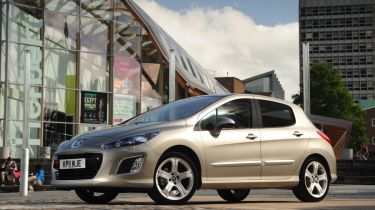Peugeot 308 review (2007-2013)
Spacious and comfortable, with efficient engines, the Peugeot 308 is a decent all-rounder

The Peugeot 308 is a stylish alternative to mainstream rivals like the Volkswagen Golf and Ford Focus, putting the emphasis on ride comfort and interior space rather than handling poise. It's also available as a more practical SW estate version and a coupe-cabriolet with a folding-metal roof. Its quirky looks and wide variety of petrol and diesel engine options – including an efficient e-HDi diesel micro-hybrid – make it a tempting family car, although it's not as fun to drive as some of its rivals.
Engines, performance and drive
The diesel models are the pick of the Peugeot 308 line-up. There are three to choose from, but all strike a good balance between low-end grunt and efficiency. The 1.6 and 2.0-litre HDi versions are commendable for their smooth power delivery, making the 308 a comfortable motorway cruiser, although are less capable when faced with winding roads. There's a lot of body roll, and the numb steering and notchy gearshift can be frustrating. The EGC automated manual is one of the jerkiest gearboxes around and, with the exception of the GT model, petrol versions feel noisy and underpowered.
MPG, CO2 and Running Costs
Peugeot's e-HDi stop and start system is exceptionally smooth, and allows drivers to switch the engine off while coasting in traffic, helping to save fuel. In its most efficient Oxygo spec, the e-HDi emits just 98g/km of C02, and will return an impressive 70.6mpg. Entry-level Access versions are poorly equipped, but do get air-con and ESP. More desirable Allure models get expensive goodies like cruise control, a panoramic glass sunroof, and dual-zone climate control included as standard. The cheaper but less efficient petrol models include a 120bhp 1.6 VTi, which emits 147g/km and returns just 44mpg.
Interior, design and technology
Thanks to recent a mid-life facelift, the refreshed Peugeot 308 range takes inspiration from the sleek SR-1 concept car, with integrated LED lights in the bumper, a slimmer grille and extra chrome trim. The quality interior shares much of its layout with the Peugeot RCZ coupe, and features some classy material finishes, although some of the ergonomics let it down. There are a lot of buttons, and the stereo and climate controls are particularly fiddly. The driving position is set very high, and the off-set pedals can make it difficult to find a comfortable driving position. These aren't problems you find in competitors like the Vauxhall Astra or Volkswagen Golf.
Practicality, comfort and boot space
Despite its attractive exterior design, the 308 is very practical, with a 347-litre boot (compared to 316 in the Ford Focus) which expands to 1,398-litres with the rear seats folded flat. The high boot-line makes it tricky to load larger objects though. Top-spec models get additional storage bins under the rear seats, and there's a handy covered area on the parcel shelf too. The wide opening rear doors and longer-than-average wheel base ensures that there's enough room to seat three adults in the back row.
Reliability and Safety
Like many small French cars, the Peugeot 308 performs very well in Euro NCAP crash tests, and was awarded five stars for adult crash protection, four stars for child protection and three for pedestrian impacts. A minimum of six airbags are included as standard too. Peugeot's reliability record is less immaculate. The brand finished 30th out of 34 in our Driver Power satisfaction survey, while the 308 didn't even appear in the top 100. Newer models like the 508 have started to change this perception, but the 308 is unlikely to ever obtain the rock-solid reputation of rivals like the Volkswagen Golf.
More reviews
Car group tests
In-depth reviews
Long-term tests
Which Is Best
Most Economical
- Name1.6 Plug-in Hybrid 195 Allure 5dr e-DSC7
- Gearbox typeSemi-auto
- RRP£38,110







